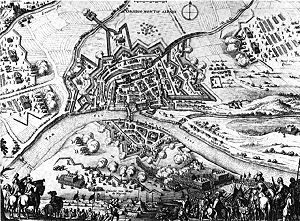
Redition of Montauban
Encyclopedia
The Redition of Montauban occurred on 21 August 1629, when the Huguenot
city of Montauban
surrendered to the Catholic
troops of the French king Louis XIII under the direction of Richelieu.
 In 1622, Mautauban had successfully resisted the assaults of Louis XIII, but the city finally lost it independence with its redition to royal forces in 1629. Montauban was considered to be the most powerful Huguenot fortress in France after La Rochelle
In 1622, Mautauban had successfully resisted the assaults of Louis XIII, but the city finally lost it independence with its redition to royal forces in 1629. Montauban was considered to be the most powerful Huguenot fortress in France after La Rochelle
.
The redition was the final chapter of the Huguenot rebellions
, as the remnants of Huguenot power in southern France surrendered to the king. After the sieges of Privas
and Alès
, the remaining Huguenot cities rapidly fell, and finally Montauban
surrendered without resistance. This was one of the last events in the repression of the Huguenot rebellions
in France
.
The redition was followed by the Peace of Alès of 27 September 1629, which settled the revolt by guaranteeing the practice of the Huguenot religion and judicial protection, but requiring Huguenot strongholds as well as political assemblies to be dismantled.
Soon after the redition, the fortifications of Montauban were taken down by Richelieu. Catholicism was reinstated in Montauban, and a governing body, formed of half Protestants and half Catholics, established, as well as a senior administrator representing the king in 1635. In the space of 30 years, numerous discriminatory rules were established against the Protestants of Montauban, from clothing to religious restrictions. The Huguenots of Montauban were finally broken by Catholic military repression, the Dragonnades, in 1683.
Huguenot
The Huguenots were members of the Protestant Reformed Church of France during the 16th and 17th centuries. Since the 17th century, people who formerly would have been called Huguenots have instead simply been called French Protestants, a title suggested by their German co-religionists, the...
city of Montauban
Montauban
Montauban is a commune in the Tarn-et-Garonne department in the Midi-Pyrénées region in southern France. It is the capital of the department and lies north of Toulouse....
surrendered to the Catholic
Catholic
The word catholic comes from the Greek phrase , meaning "on the whole," "according to the whole" or "in general", and is a combination of the Greek words meaning "about" and meaning "whole"...
troops of the French king Louis XIII under the direction of Richelieu.

La Rochelle
La Rochelle is a city in western France and a seaport on the Bay of Biscay, a part of the Atlantic Ocean. It is the capital of the Charente-Maritime department.The city is connected to the Île de Ré by a bridge completed on 19 May 1988...
.
The redition was the final chapter of the Huguenot rebellions
Huguenot rebellions
The Huguenot rebellions, sometimes called the Rohan Wars after the Huguenot leader Henri de Rohan, refers to events of the 1620s in which French Protestants , mainly located in southwestern France, revolted against royal authority...
, as the remnants of Huguenot power in southern France surrendered to the king. After the sieges of Privas
Siege of Privas
The Siege of Privas was undertaken by Louis XIII of France from 14 May 1629, and the city of Privas was captured on 28 May 1629. It was one of the last events of the Huguenot rebellions .-Context:...
and Alès
Siege of Alès
The Siege of Alès was undertaken by Louis XIII of France, and the city captured in 17 June 1629.-The siege:The Siege of Alès followed the disastrous capitulation of the main Protestant stronghold of La Rochelle, in the Siege of La Rochelle. Huguenot resistance persisted in the south of France...
, the remaining Huguenot cities rapidly fell, and finally Montauban
Montauban
Montauban is a commune in the Tarn-et-Garonne department in the Midi-Pyrénées region in southern France. It is the capital of the department and lies north of Toulouse....
surrendered without resistance. This was one of the last events in the repression of the Huguenot rebellions
Huguenot rebellions
The Huguenot rebellions, sometimes called the Rohan Wars after the Huguenot leader Henri de Rohan, refers to events of the 1620s in which French Protestants , mainly located in southwestern France, revolted against royal authority...
in France
France
The French Republic , The French Republic , The French Republic , (commonly known as France , is a unitary semi-presidential republic in Western Europe with several overseas territories and islands located on other continents and in the Indian, Pacific, and Atlantic oceans. Metropolitan France...
.
The redition was followed by the Peace of Alès of 27 September 1629, which settled the revolt by guaranteeing the practice of the Huguenot religion and judicial protection, but requiring Huguenot strongholds as well as political assemblies to be dismantled.
Soon after the redition, the fortifications of Montauban were taken down by Richelieu. Catholicism was reinstated in Montauban, and a governing body, formed of half Protestants and half Catholics, established, as well as a senior administrator representing the king in 1635. In the space of 30 years, numerous discriminatory rules were established against the Protestants of Montauban, from clothing to religious restrictions. The Huguenots of Montauban were finally broken by Catholic military repression, the Dragonnades, in 1683.

